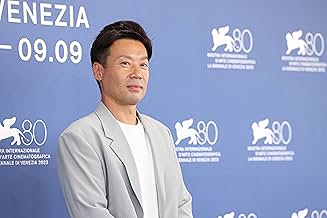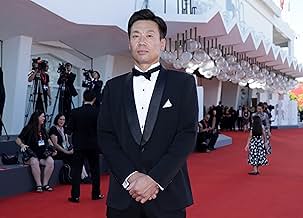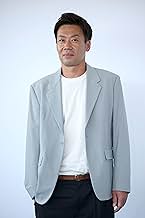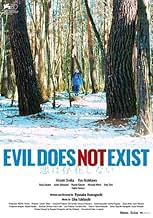CALIFICACIÓN DE IMDb
7.0/10
12 k
TU CALIFICACIÓN
Takumi y su hija Hana viven en el pueblo de Mizubiki. Un día, los habitantes del pueblo se enteran de un plan para construir un camping, que ofrezca a los residentes de la ciudad una cómoda ... Leer todoTakumi y su hija Hana viven en el pueblo de Mizubiki. Un día, los habitantes del pueblo se enteran de un plan para construir un camping, que ofrezca a los residentes de la ciudad una cómoda "escapada" a la naturaleza.Takumi y su hija Hana viven en el pueblo de Mizubiki. Un día, los habitantes del pueblo se enteran de un plan para construir un camping, que ofrezca a los residentes de la ciudad una cómoda "escapada" a la naturaleza.
- Dirección
- Guionistas
- Elenco
- Premios
- 17 premios ganados y 45 nominaciones en total
Opiniones destacadas
Ryusuke Hamaguchi's followup to his masterful DRIVE MY CAR confronts the audience with its title but eases the viewer in with a long pastoral credit sequence. Then, an abrupt cut. Hamacuchi and cinematographer Yoshio Kitagawa do this a few times during the movie, as if jarring the viewer to pay attention.
Takumi (Hitoshi Omika) is a local jack of all trades in a small secluded Japanese mountain village. He lives his daughter, Hana (Ryo Nishikawa). Takumi and his circle of friends are happy with their quiet life, but their tranquility is threatened when a large firm decides to build a glamping (glamour camping) development in the area. The company is so large that when they hold a town meeting, they outsource the task to a pair of publicists (Ryuji Kosaka and Ayaka Shibutani) - further alienating the residents.
Writer-Director Hamaguchi isn't so much interested in the nuts and bolts aspects (although that meeting amusingly delves deeply into such details as sewerage), as setting up a parable about man and nature. Hamaguchi meticulously reveals how even one small change to the Eco system can upset the natural order and balance of life.
This isn't to say that Hamaguchi completely abandons the fine tuned dialogue that made DRIVE MY CAR so indelible. There's an extended sequence when the two corporate flacks have a lengthy and fascinating personal discussion as they drive out to try and offer Takumi a role in the glamping scheme. The one significant critique here is that the movie does strain a bit in trying to make its argument. Hamaguchi has said that he began the project as a half hour dialogue free short subject. The seams do show. Still, the filmmaking is top notch and the mostly amateur cast gives it a grounded reality no matter how high-minded the themes get. The finale is devastating and will stay with you long after the fade-out.
Takumi (Hitoshi Omika) is a local jack of all trades in a small secluded Japanese mountain village. He lives his daughter, Hana (Ryo Nishikawa). Takumi and his circle of friends are happy with their quiet life, but their tranquility is threatened when a large firm decides to build a glamping (glamour camping) development in the area. The company is so large that when they hold a town meeting, they outsource the task to a pair of publicists (Ryuji Kosaka and Ayaka Shibutani) - further alienating the residents.
Writer-Director Hamaguchi isn't so much interested in the nuts and bolts aspects (although that meeting amusingly delves deeply into such details as sewerage), as setting up a parable about man and nature. Hamaguchi meticulously reveals how even one small change to the Eco system can upset the natural order and balance of life.
This isn't to say that Hamaguchi completely abandons the fine tuned dialogue that made DRIVE MY CAR so indelible. There's an extended sequence when the two corporate flacks have a lengthy and fascinating personal discussion as they drive out to try and offer Takumi a role in the glamping scheme. The one significant critique here is that the movie does strain a bit in trying to make its argument. Hamaguchi has said that he began the project as a half hour dialogue free short subject. The seams do show. Still, the filmmaking is top notch and the mostly amateur cast gives it a grounded reality no matter how high-minded the themes get. The finale is devastating and will stay with you long after the fade-out.
Ryusuke Hamaguchi has made some interesting movies in his career like Drive My Car, Happy Hour, and Asako I & II. While I haven't been wowed by his works, I appreciate many aspects of his style and approach.
Throughout, this movie has some wonderful colorful productions, camerawork, sound designs and atmosphere which helped add layers of the nature landscapes and environment. The narrative provides some interesting themes of nature, conflict of interest, humans and humans vs. Nature issues and explores some interesting aspects that are strong. The performances are all pretty good as well.
However, I am a bit underwhelmed with certain aspects as I found some of the themes feeling a little uneven to work Hamaguchi is wanting to express. Especially when it comes to the characters as while I did found some of the characters interesting, I didn't feel too emotionally connected with their personalities and purpose which made it a bit difficult to fully invest at times.
The soundtrack is wonderful and the dialogue is solid. The film does suffer some pacing issues and with an ending that leaves to many interpretations which may be frustrating for some. Overall, despite it's flaws, it's mediative and nature experience made this movie pretty good.
Throughout, this movie has some wonderful colorful productions, camerawork, sound designs and atmosphere which helped add layers of the nature landscapes and environment. The narrative provides some interesting themes of nature, conflict of interest, humans and humans vs. Nature issues and explores some interesting aspects that are strong. The performances are all pretty good as well.
However, I am a bit underwhelmed with certain aspects as I found some of the themes feeling a little uneven to work Hamaguchi is wanting to express. Especially when it comes to the characters as while I did found some of the characters interesting, I didn't feel too emotionally connected with their personalities and purpose which made it a bit difficult to fully invest at times.
The soundtrack is wonderful and the dialogue is solid. The film does suffer some pacing issues and with an ending that leaves to many interpretations which may be frustrating for some. Overall, despite it's flaws, it's mediative and nature experience made this movie pretty good.
It's funny to see people who no doubt gushed over "Perfect Days" dismiss "Evil Does Not Exist" as "boring" and "obscure". Like PD, it begins by following a man's quotidian routine: chopping wood, drawing water, identifying wild plants, teaching his daughter the names of trees. Perhaps the fact that he lives in a mountain town of no architectural or historical significance is what turns them off, but I found Takumi's activities as riveting as those of PD's public toilet cleaner.
As in "Drive My Car", we're exposed to a Japan that a few visitors--including many Japanese--have seen. As someone who was raised in Japan and returns regularly, I was thrilled to see a mountain location like the places I visited last year. I also found the plot--the incursion of a glamping company on the town's pristine land--riveting. What began as a fight-the-power, urban-rural plot turned out completely differently from the norm, a surprise I'm still thinking about days later.
As in "Drive My Car", we're exposed to a Japan that a few visitors--including many Japanese--have seen. As someone who was raised in Japan and returns regularly, I was thrilled to see a mountain location like the places I visited last year. I also found the plot--the incursion of a glamping company on the town's pristine land--riveting. What began as a fight-the-power, urban-rural plot turned out completely differently from the norm, a surprise I'm still thinking about days later.
I would describe this intriguing movie as made up of three main elements. The first one is the classical conflict between a rural community and the power of business here represented by a glamping (glamorous camping) project. This is the plot setting, but it is not the most important. The second element is represented by the consciousness and emotion of the characters, by their interactions inside the community and with the two representatives of the glamping company. The third element is the surprising and ambiguous ending where the title of the movie "Evil does not exist" becomes meaningful.
The collaboration of the director and the score composer Ishibashi Eiko is particularly interesting since the film originated from a request to create images to accompany a piece of music.
The collaboration of the director and the score composer Ishibashi Eiko is particularly interesting since the film originated from a request to create images to accompany a piece of music.
In a way it starts very cleverly with very slow nature scenes, illustrating how closely connected these people are to their natural surroundings, how they live off and in harmony with the land. They gather wood for heating, they collect spring water for drinking and cooking, they recharge by walking long distances and admiring the stunning beauty of the surroundings, they memorize the different trees, they look out for wild animals, they help each other.
And then Hamaguchi is the perfect director to create a scene showing a public gathering with public speakers and audience interaction. He did a lengthy scene in Happy Hour as well. He can create meaningful dialogue with stand-out lines. And quite a bit of tension. And we move to the theme of capitalism corrupting everything in its path, with no regard for the destruction it leaves behind. It's facts, figures, stats, consultant advice, bending the law and using it to your advantage. The waste of five people is still below the accepted limit of pollution. It's better than city water anyway.
Then we dig deeper into the struggles of the glamping company workers, who are caught between empathizing with the locals and working for a man who wants to make money. He is not exactly a ruthless money man, he is actually trying to run a profitable business and sees the bottom line. The advisor is the cynical one. But the director takes the advice to heart. The funds are received and partially spent, he can't back down.
And then there's the enigmatic Takumi, the quiet, but trusted lumberjack, or jack of all trades and the poor hapless Takahashi, the former talent agent who experiences a sudden urge to commune with nature.
Slow start that kind of makes sense in the grand scheme of things, but it still tests your patience, and indeed a very odd, somewhat upsetting and inexplicable ending. The middle part is sublime but the rest didn't quite gel well together.
I read the director's explanation, but it's still not coming through in my opinion.
And then Hamaguchi is the perfect director to create a scene showing a public gathering with public speakers and audience interaction. He did a lengthy scene in Happy Hour as well. He can create meaningful dialogue with stand-out lines. And quite a bit of tension. And we move to the theme of capitalism corrupting everything in its path, with no regard for the destruction it leaves behind. It's facts, figures, stats, consultant advice, bending the law and using it to your advantage. The waste of five people is still below the accepted limit of pollution. It's better than city water anyway.
Then we dig deeper into the struggles of the glamping company workers, who are caught between empathizing with the locals and working for a man who wants to make money. He is not exactly a ruthless money man, he is actually trying to run a profitable business and sees the bottom line. The advisor is the cynical one. But the director takes the advice to heart. The funds are received and partially spent, he can't back down.
And then there's the enigmatic Takumi, the quiet, but trusted lumberjack, or jack of all trades and the poor hapless Takahashi, the former talent agent who experiences a sudden urge to commune with nature.
Slow start that kind of makes sense in the grand scheme of things, but it still tests your patience, and indeed a very odd, somewhat upsetting and inexplicable ending. The middle part is sublime but the rest didn't quite gel well together.
I read the director's explanation, but it's still not coming through in my opinion.
¿Sabías que…?
- TriviaIn an interview with "The Los Angeles Times" published on May, 2, 2024, director Ryûsuke Hamaguchi decided to cast Hitoshi Omika as the lead role after Omika spent much time driving Hamaguchi around to rural locations in Japan to pick out locations to film for the director's concert film "Gift". This somewhat mirrored the plot of Hamaguchi's "Drive My Car".
- Bandas sonorasFether
composed by Eiko Ishibashi
Selecciones populares
Inicia sesión para calificar y agrega a la lista de videos para obtener recomendaciones personalizadas
- How long is Evil Does Not Exist?Con tecnología de Alexa
Detalles
Taquilla
- Total en EE. UU. y Canadá
- USD 831,685
- Fin de semana de estreno en EE. UU. y Canadá
- USD 42,752
- 5 may 2024
- Total a nivel mundial
- USD 3,261,306
- Tiempo de ejecución
- 1h 46min(106 min)
- Color
- Mezcla de sonido
- Relación de aspecto
- 1.66 : 1
Contribuir a esta página
Sugiere una edición o agrega el contenido que falta

























